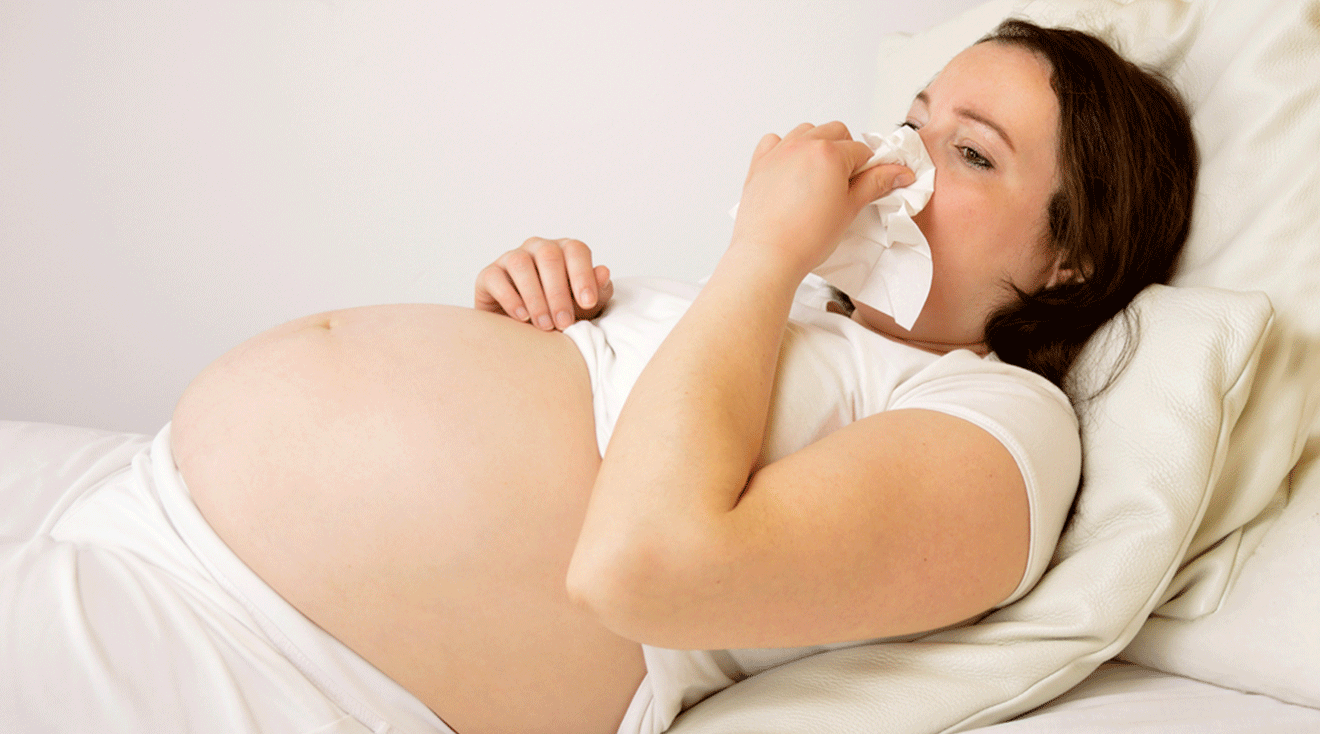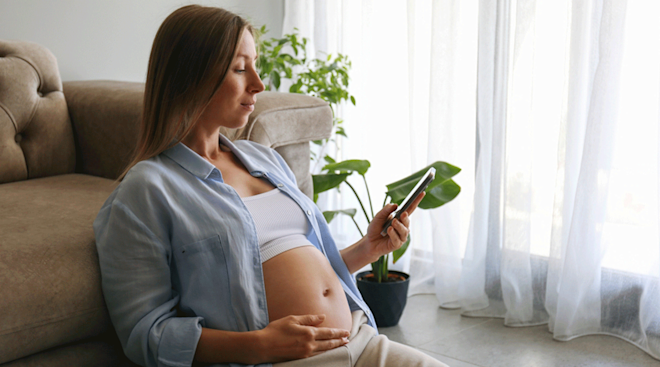How to Deal With Allergies During Pregnancy
If you’re pregnant with allergies, you’re most definitely not alone. Plenty of pregnant people report new or worsening itchiness, nasal congestion and other pesky symptoms. “In the past few years, I’ve developed seasonal allergies and have always been allergic to cats. Since becoming pregnant, I’ve noticed new allergies popping up. The most recent one I can pinpoint is apples. I hope this goes away after my little one arrives!” says The Bump community member aminalex.
If you’re wondering what causes allergies during pregnancy, what symptoms to look out for, and what treatments to consider—both medicine and natural remedies—we’ve queried the experts, ahead.
- You typically won’t develop new allergies during pregnancy, although existing allergies may get worse.
- Allergy symptoms during pregnancy, just as outside of pregnancy, usually include congestion, sneezing, and itchy or watery eyes.
- Many over-the-counter oral antihistamines such as Benadryl and Zyrtec are generally considered safe for pregnancy. You can also use natural remedies such as a neti pot.
While it may feel like your pregnancy caused you to suddenly start sneezing and wheezing, allergies typically start before pregnancy, says Anastasiya Kleva, MD, a board-certified allergist at ENT and Allergy Associates in New Rochelle and White Plains, New York. “Usually you go into pregnancy with allergies,” she says. “It might just be that you haven’t looked for allergies before you were pregnant.”
Most people develop allergies due to a combination of environmental and genetic factors. “Having just one parent with allergies increases your risk,” says Purvi Parikh, MD, an allergist/immunologist with Allergy & Asthma Network.
According to Johns Hopkins Medicine, allergies are your immune system’s response to substances such as dust, mold or pollen. Your immune system may overreact by producing antibodies that fight back against the allergen, which can result in a wide range of symptoms.
The signs of pregnancy allergies are the same as when you’re not pregnant—but that doesn’t make them any easier to deal with. These are the major signs you’re struggling with seasonal and indoor allergies during pregnancy, according to Parikh:
- Nasal congestion
- Coughing
- Wheezing
- Headaches
- Sneezing
- Itchy, watery eyes
- Itchy-feeling ears
- Itchy throat
- Rashes
Less commonly, allergies can lead to anaphylaxis, a life-threatening reaction. Symptoms can include a sudden drop in blood pressure, itchiness or hives over most of the body, swelling of the throat and tongue, and difficulty breathing or shortness of breath, according to Johns Hopkins Medicine. This is an emergency in which case you should see a healthcare provider right away.
Allergies vs normal pregnancy symptoms
Pregnancy can do some weird things to your body—including stuff up your nose—so it can be tough to know if you’re dealing with allergies or pregnancy-related symptoms. Still, there are a few clues.
Allergies usually involve congestion, sneezing and itchy or watery eyes. “They can be distinguished from respiratory infections because they don’t cause fever, or make the individual feel ‘sick,’” says Jonathan Schaffir, MD, an ob-gyn at The Ohio State University Wexner Medical Center. But pregnancy can sometimes increase congestion of the blood vessels in your sinuses because of the extra fluid that circulates in your body when you’re pregnant, and this can cause a stuffy nose, he says. The condition is called pregnancy rhinitis, and it can last your whole pregnancy, Kleva says. “Allergies would feel different because there’s usually a trigger, with the symptoms going away when the trigger is removed, and also are usually accompanied by sneezing and red eyes,” Schaffir says.
Skin testing is usually the go-to for doctors to test for allergies, but they don’t typically do it when you’re pregnant because of the theoretical risk for an allergic reaction, Kleva says. Instead, your doctor will give you a blood test, which Kleva says is “almost as good as a skin test.” If you’re struggling with shortness of breath or asthma symptoms, your doctor may also recommend a breathing test called spirometry or pulmonary function tests (noninvasive tests that tell how well your lungs are working), Parikh says.
If you’ve been suffering from a stuffy, runny nose for long enough, you’re likely wondering what allergy medicine during pregnancy it’s safe to take. Antihistamines such as diphenhydramine (Benadryl), loratadine (Claritin) and cetirizine (Zyrtec) are safe to use when you’re pregnant with allergies, Schaffir says. “Benadryl is in the same class of medications that are used for morning sickness, so there may be a double benefit,” he adds.
Nasal sprays are more tricky and you should especially check in with your doctor before using corticosteroid nasal sprays, per the American College of Allergy, Asthma & Immunology (ACAAI). The safest nasal spray is likely oxymetazoline, which is in products like Afrin, because there’s minimal absorption into the bloodstream. In general, it’s a good idea to use nasal sprays sparingly as they can cause rebound congestion, says the ACAAI.
However, it’s a good idea to check in with your ob-gyn before taking any kind of medication during pregnancy. Some allergy meds like Allegra aren’t considered safe to use when pregnant, Kleva says, and it never hurts to double-check with your doctor.
My allergies have gotten worse since getting pregnant. I'm currently in the mountains at a ski resort, it's snowing, temperatures are below freezing and I'm still sneezing like crazy. (What could possibly be blooming that I'd be reacting to in this weather?) My doctor told me it’s safe to take Zyrtec, and that has helped some. It also helps to use a nasal rinse system, which will clear some of the allergens out of your nose.
If you’re nervous about taking allergy meds during pregnancy, or just want to do everything you can to ease your symptoms naturally, Parikh recommends a few home remedies to help prevent symptoms:
- Change your clothes as soon as you get home. Your clothes can pick up allergens like pollen when you’re out and about, and changing them lowers the odds you’ll keep breathing them in.
- Shower and wash your hair when you come in from the outdoors. Your hair and skin also pick up allergens when you’re outside, and washing off can remove them.
- Dust and vacuum your home regularly. It’s probably the last thing you want to do when you’re pregnant, but cleaning can get rid of potential irritants that can bother you.
- Try to limit going outside at dawn. This is when pollen counts are the highest—and can make you the most stuffy.
Mayo Clinic recommends nasal irrigation (aka a neti pot), saline nasal spray or nasal strips to keep your passages open.
I felt terrible during all three of my pregnancies. Morning sickness, discomfort, gestational diabetes, you name it. One thing that actually improved while I was expecting: my allergies! I got a nine-month reprieve from my typical stuffiness and itchy eyes. They totally disappeared. Of course, they returned soon enough! But I was happy to replace the nonstop nausea with my normal congestion.
Frequently Asked Questions
Can you develop allergies during pregnancy?
While it’s entirely possible to develop allergies during pregnancy, it’s more common to already have allergies before conception, according to the Allergy & Asthma Network.
Anne Liu, MD, a board-certified allergy, immunology and infectious disease physician at Stanford Medicine Children’s Health, notes that the rate of allergy development “slows substantially in adulthood, assuming one is living in the same place and eating the same diet as prior to pregnancy.” You can develop new environmental allergies when you move to a new location, and you can develop medication allergies at any point in life, she adds.
Are allergies worse during pregnancy?
“It’s common, although not universal, in pregnancy to experience worsening of nasal congestion and/or asthma, whether someone has allergies or not,” says Liu. The worsening of nasal congestion—aka pregnancy rhinitis—is likely caused by hormonal changes.
Can allergies get better or disappear during pregnancy?
Sometimes the symptoms of allergies during pregnancy can improve, says Liu, but “the underlying allergic sensitizations don't go away and then the symptoms will typically return after delivery.”
Can you take allergy shots during pregnancy?
Allergy shots, which are meant to desensitize you so your immune system doesn’t react as strongly to particular allergens, are generally considered okay during pregnancy, Schaffir says. However, Liu adds, healthcare providers don’t typically start patients on allergy shots during pregnancy—they might have you continue on the same dose, but not increase the dose.
Can you develop food allergies during pregnancy?
New food allergies during pregnancy aren’t too common but can happen, says Liu. “Testing for food allergies during pregnancy is best done by blood tests and not skin tests because of the very small, but nonzero risk of systemic reaction to skin testing,” she adds.
Are allergy eye drops safe during pregnancy?
There isn't enough data on the safety of allergy eye drops during pregnancy to say with certainty, says Liu. “Some oral antihistamines including cetirizine haven’t shown any concerning safety issues in pregnancy,” she adds. (Cetirizine is a common ingredient in oral antihistamines such as Zyrtec, as well as in allergy eye drops.) Still, check in with your doctor before using allergy eye drops during pregnancy.
Can pregnancy allergies affect baby?
In general, this isn’t something you have to stress about, Schaffir says. “Allergies are very common, and are a way the body's immune system reacts inappropriately to a foreign protein that’s not really a threat to health,” he says. Seasonal and indoor allergies don’t affect baby, he adds.
If you’re struggling with allergies during pregnancy, don’t just suffer through it—call your doctor. There are plenty of over-the-counter remedies if you’re pregnant with allergies—and a few things you can do at home without medicine, too. Either way, your healthcare provider should be able to help steer you in the right direction so you can find relief.
Please note: The Bump and the materials and information it contains are not intended to, and do not constitute, medical or other health advice or diagnosis and should not be used as such. You should always consult with a qualified physician or health professional about your specific circumstances.
Plus, more from the Bump:
Anastasiya Kleva, MD, is a board-certified allergist at ENT and Allergy Associates based in New Rochelle and White Plains, New York. She earned her medical degree from Virginia Commonwealth University and completed her residency at NSLIJHS/Hofstra School of Medicine.
Anne Liu, MD, is a board-certified allergy, immunology and infectious disease physician at Stanford Medicine Children’s Health. She’s also a clinical associate professor in the Department of Medicine, Division of Infectious Diseases and the Department of Pediatrics, Division of Allergy, Immunology, and Rheumatology at Stanford University School of Medicine. She earned her medical degree from the University of California, Los Angeles David Geffen School of Medicine.
Purvi Parikh, MD, FACP, FACAAI, is an allergist and immunologist with Allergy & Asthma Network, as well as a clinical associate professor in the department of pediatrics at NYU Grossman School of Medicine in New York City. She earned her medical degree from Saint George’s University and completed her residency at Cleveland Clinic Hospital.
Jonathan Schaffir, MD, is an ob-gyn at The Ohio State University Wexner Medical Center and a past president of the North American Society for Psychosocial Obstetrics and Gynecology. He earned his medical degree from Brown University.
Allergy & Asthma Network, Pregnancy and Allergies
American College of Allergy, Asthma & Immunology, Pregnancy and Allergy, April 2018
Johns Hopkins Medicine, Allergies and the Immune System
Mayo Clinic, Is It Safe to Take Claritin or Other Allergy Medicines During Pregnancy?
StatPearls, Cetirizine, May 2024
Real-parent perspectives:
- Lauren Barth, associate director at The Bump and mom of three
- aminalex, The Bump community member
- meganmgmiller
Learn how we ensure the accuracy of our content through our editorial and medical review process.
Navigate forward to interact with the calendar and select a date. Press the question mark key to get the keyboard shortcuts for changing dates.




















































